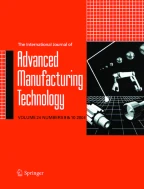Abstract
Manufacturing and production plants operate physical machine that will deteriorate with increased usage and time. Maintenance planning which can keep machines in good operation is thus required for smooth production. However, in previous research, production scheduling and maintenance planning are usually performed individually and not studied as an integrated model. In order to balance the trade-offs between them, this study proposes an integrated scheduling model by incorporating both production scheduling and preventive maintenance planning for a single-machine problem with the objective of minimizing the maximum weighted tardiness. In this model, a variable maintenance time subjected to machine degradation is considered. Finally, a numerical example using this improved production scheduling model is shown. The computational results prove its efficiency.
Similar content being viewed by others
References
Chen JS (2006) Optimization models for the machine scheduling problem with a single flexible maintenance activity. Eng Optim 38:53–71
Pinedo ML (2008) Scheduling: theory, algorithms and systems. Prentice-Hall, Englewood Cliffs, NJ
Segawa Y, Ohnishi M, Ibaraki T (1992) Optimal minimal-repair and replacement problem with age dependent cost structure. Comput Math Appl 24:91–101
Art RHPM, Knapp GM, Lawrence MJ (1998) Some aspects of measuring maintenance in the process industry. J Qual Maint Eng 4:6–11
Schmidt G (2000) Scheduling with limited machine availability. Eur J Oper Res 121:1–15
Adiri I, Frostig E, Rinnooy KAHG (2006) Scheduling on a single machine with a single breakdown to minimize stochastically the number of tardy jobs. Nav Res Logist 38:261–271
Lee CY, Liman SD (1993) Capacitated two-parallel machine scheduling to minimize sum of job completion time. Discrete Appl Math 41:211–222
Mosheiov G (1994) Minimizing the sum of job completion times on capacitated parallel machines. Math Comput Model 20:91–99
Espinouse ML, Formanowicz P, Penz B (1999) Minimizing the makespan in the two-machine no-wait flow-shop with limited machine availability. Comput Ind Eng 32:497–500
Qi X, Chen T, Tu F (1999) Scheduling the maintenance on a single machine. J Oper Res Soc 50:1071–1078
Lee CY (1996) Machine scheduling with an availability constraint. J Glob Optim 9:395–416
Liao CJ, Chen WJ (2003) Single-machine scheduling with periodic maintenance and nonresumable jobs. Comput Oper Res 30:1335–1347
Sadfi C, Penz B, Rapine C, Błażewicz J, Formanowicz P (2005) An improved approximation algorithm for the single machine total completion time scheduling problem with availability constraints. Eur J Oper Res 161:3–10
Wodecki M (2009) A block approach to earliness-tardiness scheduling problems. Int J Adv Manuf Technol 40:797–807
Allaoui H, Artiba A (2004) Integrating simulation and optimization to schedule a hybrid flow shop with maintenance constraints. Comput Ind Eng 47:431–450
Allaoui H, Artiba A (2006) Two stage hybrid flow shop scheduling with availability constraints. Comput Oper Res 33:1399–1419
Haq AN, Ramanan TR (2006) A bicriterian flow shop scheduling using artificial neural network. Int J Adv Manuf Technol 30:1132–1138
Sherif YS, Smith ML (1981) Optimal maintenance models for systems subject to failure—a review. Nav Res Logist Q 28:47–74
Shapiro JF (1993) Mathematical programming models and methods for production planning and scheduling. In: Graves SC, Rinnooy KAHG, Zipkin PH (eds) Handbook in Operations Research and Management Science 4: Logistics of Production and Inventory. North-Holland, Amsterdam, pp 371–443
Dekker R (1996) Application of maintenance optimization models: a review and analysis. Reliab Eng Syst Saf 51:229–240
Cassady CR, Kutanoglu E (2005) Integrating preventive maintenance planning and production scheduling for a single machine. IEEE Trans Reliab 54:304–309
McCall JJ (1965) Maintenance policies for stochastically failing equipment: a survey. Manag Sci 11:493–524
Pierskalla WP, Voelker JA (1976) A survey of maintenance models: the control and surveillance of deteriorating systems. Nav Res Logist Q 23:353–388
Valdez-Flores C, Feldman RM (1989) Survey of preventive maintenance models for stochastically deteriorating single-unit systems. Nav Res Logist Q 36:419–446
Van Dijkhuizen G, van der Heijden M (1999) Preventive maintenance and the interval availability distribution of an unreliable production system. Reliab Eng Syst Saf 66:13–27
Zhao YX (2003) On preventive maintenance policy of a critical reliability level for system subject to degradation. Reliab Eng Syst Saf 79:301–308
Ruiz R, García-Díaz JC, Maroto C (2007) Considering scheduling and preventive maintenance in the flowshop sequencing problem. Comput Oper Res 34:3314–3330
Nguyen DG, Murthy DNP (1981) Optimal preventive maintenance policies for repairable systems. Oper Res 29:1181–1194
Graves GH, Lee CY (1999) Scheduling maintenance and semiresumable jobs on a single machine. Nav Res Logist 46:845–863
Lee CY, Chen ZL (2000) Scheduling jobs and maintenance activities on parallel machines. Nav Res Logist 47:145–165
Merten AG, Muller ME (1972) Variance minimization in single machine sequencing problems. Manag Sci 18:518–528
Schrage L (1975) Minimizing the time-in-system variance for a finite jobset. Manag Sci 21:540–543
Chen M, Feldman RM (1997) Optimal replacement policies with minimal repair and age-dependent costs. Eur J Oper Res 98:75–84
Reineke DM, Murdock WPJ, Pohl EA, Rehmert I (1999) Improving availability and cost performance for complex systems with preventive maintenance. Proceedings of the Annual Reliability and Maintainability Symposium 1999:383–388
Kumar UD, Crocker J, Knezevic J (1999) Evolutionary maintenance for aircraft engines. Proceedings of the Annual Reliability and Maintainability Symposium 1999:62–68
Nakagawa T, Nakamura S (2007) Entoropy model with application to maintenance policy. IEEM 2007:654–656
Cassady CR, Kutanoglu E (2003) Minimizing job tardiness using integrated preventive maintenance planning and production scheduling. IIE Transactions 35:503–513
Author information
Authors and Affiliations
Corresponding author
Rights and permissions
About this article
Cite this article
Pan, E., Liao, W. & Xi, L. Single-machine-based production scheduling model integrated preventive maintenance planning. Int J Adv Manuf Technol 50, 365–375 (2010). https://doi.org/10.1007/s00170-009-2514-9
Received:
Accepted:
Published:
Issue Date:
DOI: https://doi.org/10.1007/s00170-009-2514-9
